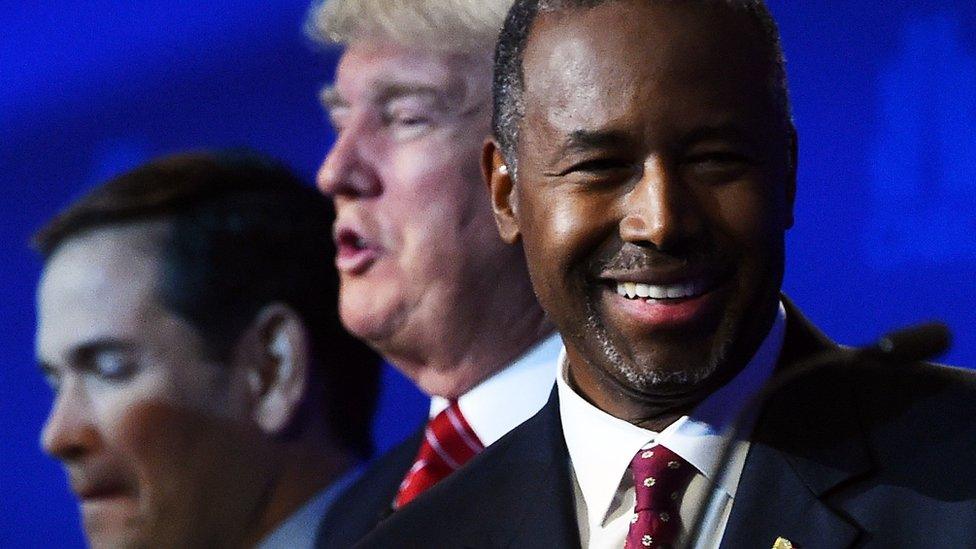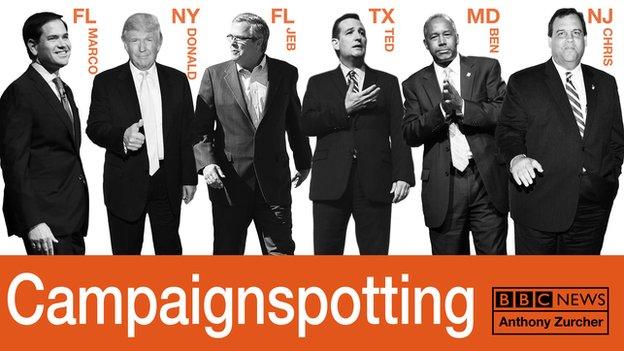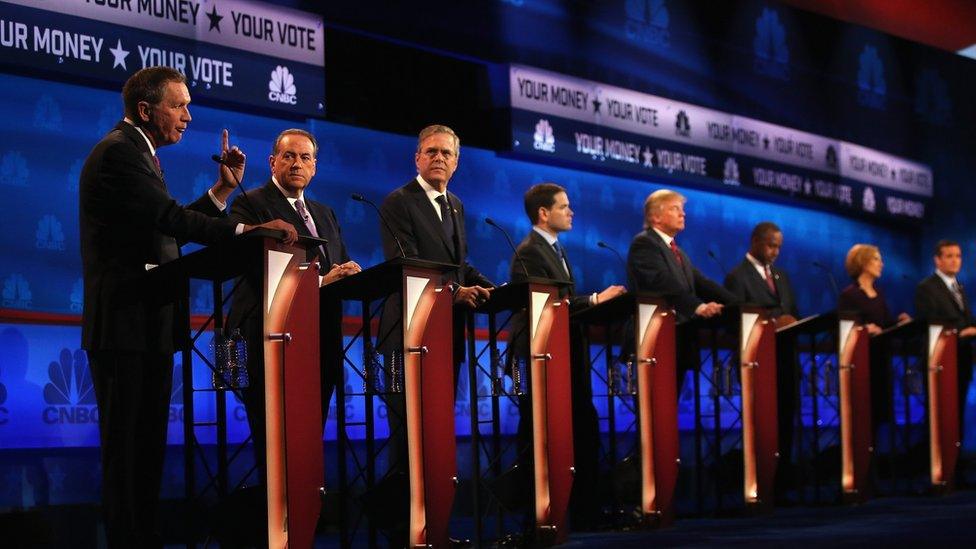Republicans make debate offer media can't refuse?
- Published

Like a scene out of the Godfather, the heads of the Republican presidential campaign families gathered on Sunday to settle some scores.
Topping the hit list were the television networks that have hosted the last three presidential debates and the Republican National Committee, which set up the terms of the events.
The consensus following last week's much-criticised debate hosted by CNBC was that the tone of the questioning was too derisive and the amount of time given to the candidates was too uneven.
Although CNBC was seen as an egregious offender, the anger over the structure of the debates has been an ongoing issue for the campaigns that at last reached critical mass.
So representatives of every campaign except Carly Fiorina's sat down around a conference table in a nondescript Washington-area hotel room purportedly to wrest power out of the hands of the RNC - voice of the often derided party establishment - and the hated liberal media.

The end result, however, was less a Hollywood-style gangland war than a Sunday evening slap-fight.
At the heart of the problem is that while the campaigns are unified in their dissatisfaction with the process, no one can agree on exactly what needs to be fixed.
Candidates who have been consigned to the early "undercard" debate - like South Carolina Senator Lindsey Graham and Louisiana Governor Bobby Jindal - demanded a place on the big stage.
Ben Carson's people supported this expansion, while Donald Trump's men want fewer candidates.
"Why do I want to let someone who's polling at 0.1% on that stage so he can take shots at Trump?" Mr Trump's campaign manager reportedly said, external during the meeting.
Jeb Bush's team asked that NBC-owned Spanish-language network Telemundo be reinstated as co-host of the February debate in Houston, airing concerns that the party was alienating Latino voters. Trump's campaign was adamantly opposed and threatened to boycott.
"Some candidates want more time per candidate, more candidates on stage and shorter debates," quips, external Washington Post columnist Catherine Rampell via Twitter. "They wonder why moderators question their math skills."

Republicans can't decide whether there are too many participants in their debates - or too few
In the end, the list of demands leaked from the meeting - as first covered, external by the Washington Post - was less an offer that can't be refused than offer that can't be too serious.
Media sponsors must inform candidates of how far the lavatories are from the lecterns and not show shots of an empty stage following commercial breaks.
Candidates should not be allowed to ask each other questions, and they can't be given yes-or-no prompts from moderators without allowing proper time to expand on answers.
The temperature in the auditorium must be below 67F (19C). After the second debate in Los Angeles, Mr Trump repeatedly complained about the heat, while Marco Rubio looked like he had just emerged from a sauna.
All that was missing, it seemed, were demands for fruit bowls and fresh-cut flowers for each candidate backstage.
And in case there's any doubt who the real capo dei capi of the conservative movement is, the list of demands - offered along with a questionnaire for media bosses - did not apply to the host of next week's debate, Fox News's business channel.
According to one source at the meeting quoted by the Washington Post, the campaigns didn't want to cross the media giant and provoke the anger of news department head, Roger Ailes.
"Questions were more hostile, less substantive" at the Fox News debate in August, tweets, external Vox's Ezra Klein. "But they were aimed at Trump, so Republicans didn't care."
As the various campaign representatives scattered across the nation after Sunday night's meeting, there were promises of more specific instructions for debate hosts - and Republican Party officials - to come. Candidates may request time for opening and closing statements and control over how they are identified in on-screen graphics. (Mr Bush's campaign had been irked that he was labelled a banker by CNBC and not as a former Florida governor.)
The RNC even engaged in some pre-emptive bloodletting, shuffling the staffers in charge of handling future debate negotiations.
On Monday the Washington Post reported, external that the group efforts made on Sunday night may all be for naught, as Mr Trump's team signalled they weren't going to sign on to the draft letter and will negotiate directly with the debate networks on their own.
For all the talk of a post-debate Rubio surge, it's clear the centre of gravity in the Republican race for the White House still firmly rests in a top-floor suite of Manhattan's Trump Tower .
There will only be one way to settle the Republican Party's "family business", and that's at the ballot box next year.
Candidates in (and out of) the Republican presidential field
